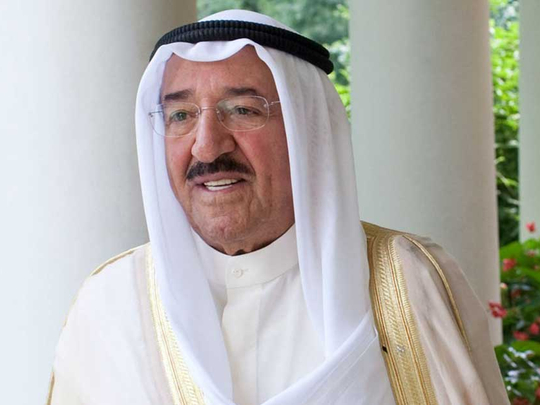
Manama: Kuwait’s Emir Shaikh Sabah Al Ahmad Al Jaber Al Sabah on Tuesday told the newly-formed cabinet that they should be working with a spirit of solidarity, mutual support, and full cooperation based on trust and respect between the legislative and executive branches.
“The new cabinet has been formed amid critical conditions abroad, and difficult internal challenges that require wisdom, sagacity and foresight to best deal with them,” Shaikh Sabah told the ministers as they took the oath a day after they were officially nominated as members of the 35th government in Kuwait’s post-independence history.
“These conditions and challenges require that you intensify your efforts and commitments to carry out the tasks and assume the responsibilities entrusted to you to achieve the aspirations of our beloved country, for comprehensive and sustainable development, the continuation of the economic reforms and the swift completion of current development projects.”
Shaikh Sabah said he had full confidence in the ministers to carry out their responsibilities and achieve the best interests of Kuwait and its citizens.
In his statement, Prime Minister Shaikh Jaber Al Mubarak Al Hamad Al Sabah, who is heading his seventh government since he was first appointed in 2011, thanked the Emir for his confidence in the government, and pledged that all ministers would work hard to rise to the trust of the emir and the nation, despite the critical circumstances.
“We are fully aware of the challenges as the nation moves forward and of the dangers and threats to our beloved homeland in light of the current regional situation,” Shaikh Jaber said. “This means that our responsibilities are bigger and that we must intensify our efforts to work hard and productively to achieve the anticipated objectives for the country and fulfil the aspirations of Kuwaitis.”
Shaikh Jaber added the government would cooperate with the parliament.
“Cooperation between the two branches consolidates the provisions of the constitution and reinforces parliamentary traditions and Kuwait’s values and traditions,” Shaikh Jaber said.
The cabinet was formed 40 days after the last cabinet resigned on October 30, following an increasingly bitter standoff with lawmakers who insisted on grilling the information minister and threatened to question other ministers.
Eight of the 16 ministers in the new cabinet are aged between 40 and 50.
However, observers have expressed concerns the new cabinet would not last, and preferred to refer to it as a “temporary transitional government”, Kuwaiti daily Al Seyassah reported on Tuesday.
The conclusion was reportedly based on the initial reactions by some lawmakers, who said the re-appointment of some ministers could mean further attempts to grill them.










